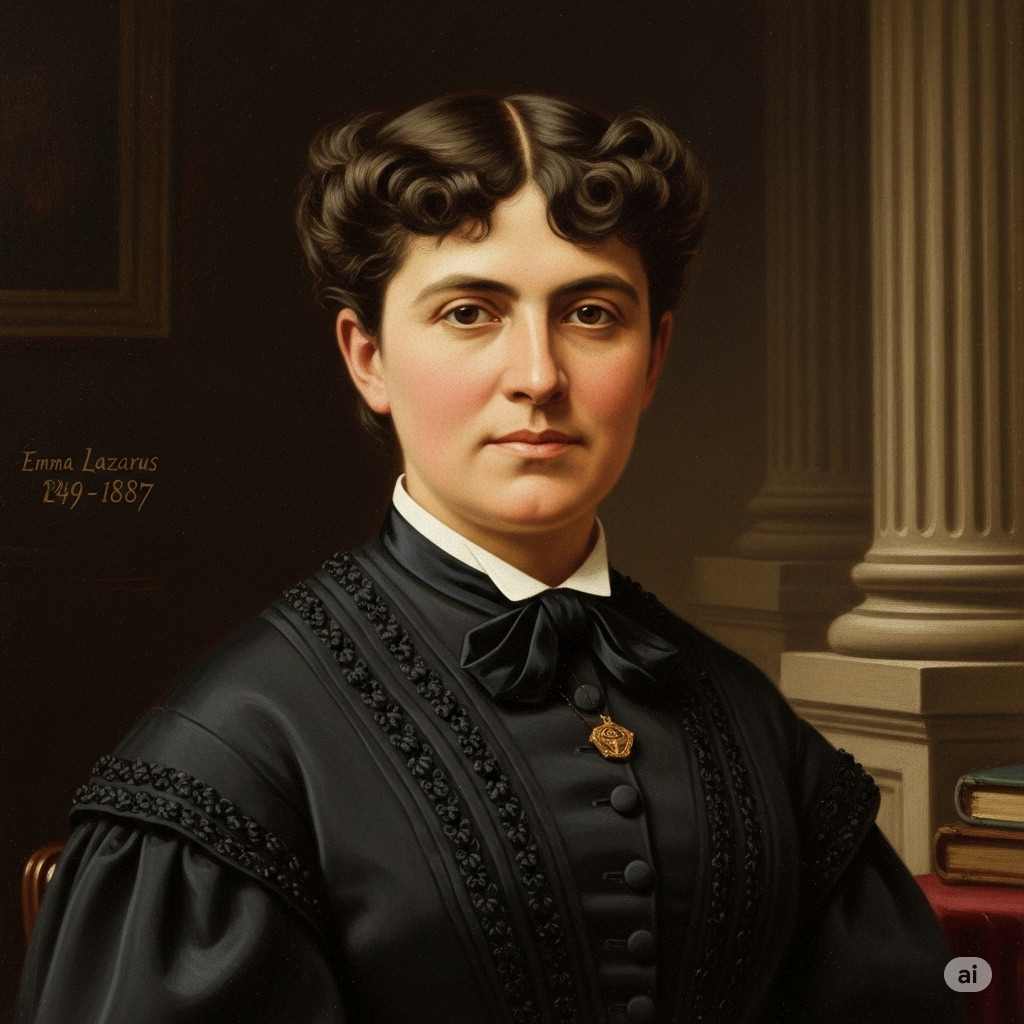1 Poems by Emma Lazarus
1849 - 1887
Emma Lazarus Biography
Emma Lazarus was born on July 22, 1849, in New York City to a wealthy Sephardic Jewish family. Her father, Moses Lazarus, was a sugar refiner, and her mother, Esther Nathan, came from an established New York family. Emma was the fourth of seven children.
Growing up in a cultured and affluent environment, Lazarus received a private education that included multiple languages and classical literature. She showed an early aptitude for poetry, publishing her first book, "Poems and Translations," at the age of 17. This early work caught the attention of Ralph Waldo Emerson, who became her mentor and friend.
Throughout the 1870s, Lazarus continued to develop her poetic voice. She published her second book, "Admetus and Other Poems," in 1871. Her work during this period often drew inspiration from classical and romantic themes, reflecting her extensive education in European literature.
Lazarus's poetry began to take on a more political tone in the 1880s, influenced by the increasing anti-Semitism in Europe and the subsequent waves of Jewish immigrants arriving in the United States. The Russian pogroms of 1881-1882 particularly affected her, leading to a deepening of her Jewish identity and a commitment to Jewish causes.
In response to the refugee crisis, Lazarus became involved in charitable work, teaching English to Jewish immigrants at the Hebrew Emigrant Aid Society. This experience profoundly influenced her writing, leading to works that addressed the immigrant experience and called for greater acceptance of Jewish refugees.
One of Lazarus's most significant works from this period was "Songs of a Semite: The Dance to Death and Other Poems" (1882), which explored Jewish history and identity. She also wrote essays advocating for a Jewish homeland, anticipating the Zionist movement by more than a decade.
In 1883, Lazarus wrote what would become her most famous work, the sonnet "The New Colossus." The poem was composed for an auction to raise funds for the pedestal of the Statue of Liberty. While it received little attention at the time, it would later be inscribed on a bronze plaque and mounted inside the pedestal of the statue in 1903, 16 years after Lazarus's death.
"The New Colossus" reimagined the Statue of Liberty as a symbol of welcome for immigrants, famously describing her as the "Mother of Exiles" and declaring, "Give me your tired, your poor, / Your huddled masses yearning to breathe free." These lines have since become an iconic representation of America's immigrant heritage.
Beyond her poetry, Lazarus was also an accomplished essayist and translator. She translated works from German and French, including poems by Heinrich Heine. Her essays on Jewish topics were published in various periodicals and later collected in the book "An Epistle to the Hebrews" (1900).
Lazarus traveled to Europe in 1883, visiting England, France, Italy, and Germany. She met with Jewish leaders and continued to write about Jewish issues. However, her health began to decline shortly after her return to the United States in 1887.
Emma Lazarus died on November 19, 1887, at the age of 38, likely from Hodgkin's lymphoma. Her death came before she could see the full impact of her work, particularly "The New Colossus."
Lazarus's legacy extends beyond her most famous poem. She is considered an important voice in American Jewish literature and an early proponent of Jewish nationalism. Her work bridged multiple worlds - the secular and the religious, the American and the Jewish - and advocated for social justice and acceptance of immigrants.
Today, Emma Lazarus is remembered not only for her contributions to American poetry but also for her role in shaping the American ideal of welcoming immigrants. Her life and work continue to be relevant in discussions about immigration, national identity, and the Jewish-American experience.
This text was generated by AI and is for reference only. Learn more
Username Information
No username is open
Unique usernames are free to use, but donations are always appreciated.
Quick Links
© 2024-2025 R.I.Chalmers (V2Melody).

All music on this site by R.I.Chalmers (V2Melody) is licensed under a Creative Commons Attribution-NonCommercial 4.0 International License.
Attribution Requirement:
When using this music, you must give appropriate credit by including the following statement (or equivalent) wherever the music is used or credited:
"Music by R.I.Chalmers (V2Melody) – https://v2melody.com"
Support My Work:
If you enjoy this music and would like to support future creations, donations are always welcome but never required.
Donate


